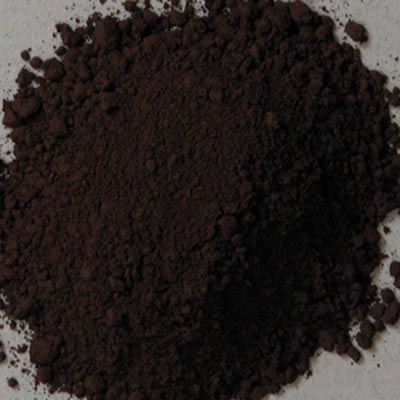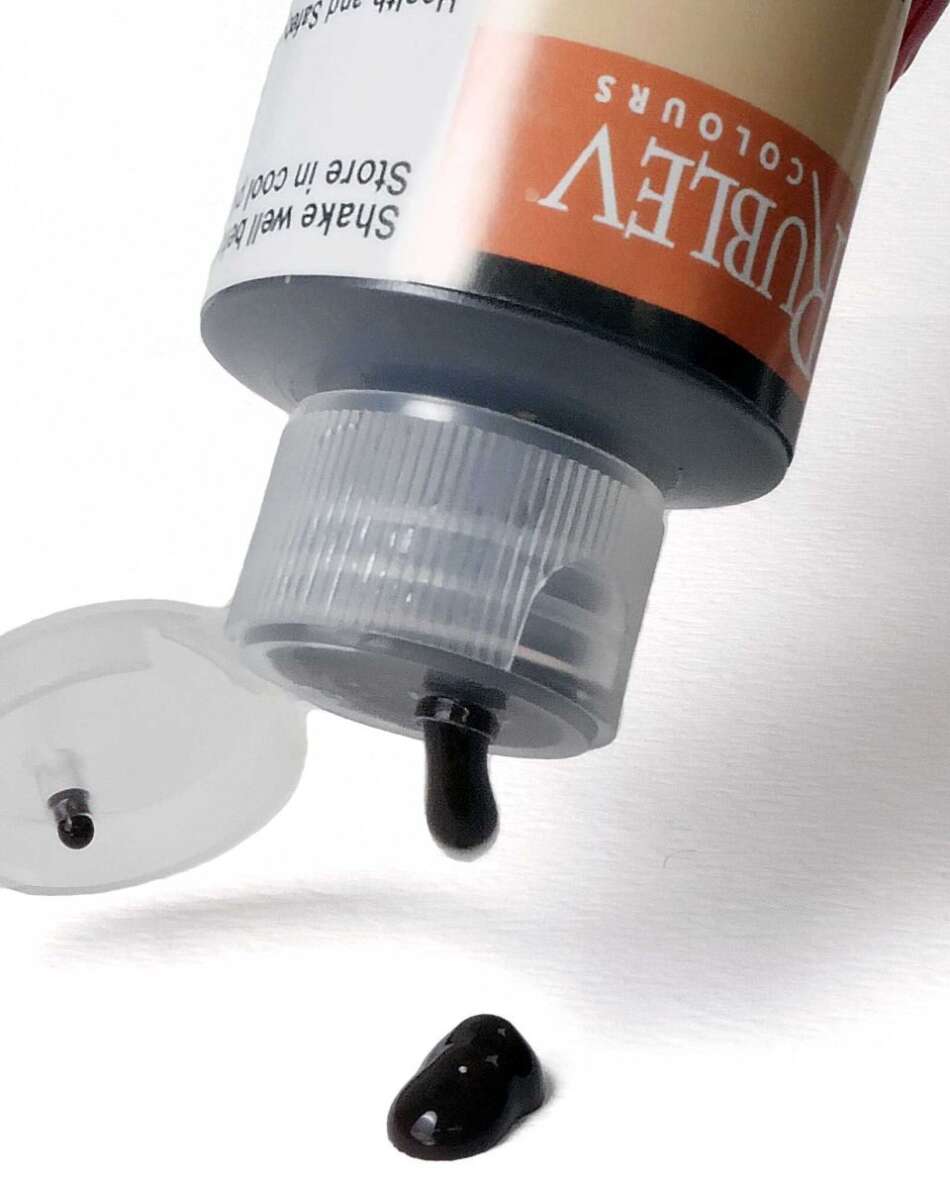Cassel Earth Dispersion
As low as $13.20
In stock
Only %1 left
SKU
281-12
Cassel Earth aqueous pigment dispersion is a deep semi-transparent brown color, supposed to be the color used by Anthony van Dyke in his paintings. Our Cassel earth is imported from Germany.
Cassel earth is a pigment of a deep semi-transparent brown color, supposed to be the color used by Rubens and Anthony Van Dyke in their paintings. Rublev Colours Cassel Earth is imported from Germany.
Rublev Colours Aqueous Pigment Dispersions are pigments dispersed in water ready to be mixed with water-based mediums. These dispersions are especially made for use with traditional painting mediums, such as egg, casein, fresco, watercolors and distemper (glue tempera). They are also ideally suited for use with gesso for making toned grounds for drawing and painting.
Pigment dispersions from Rublev Colours contain only naturally-derived ingredients, in addition to pigment and water, making them ideally suited for traditional and natural mediums. Unlike other pigment dispersions that are typically made for acrylic medium, Rublev Colours Aqueous Dispersions do not contain coalescent solvents, artificial dispersing resins and other additives that interfere with natural mediums.
Rublev Colours Aqueous Dispersions make preparing traditional mediums easy; you do not have to hassle with powders, grinding pigments with expensive tools and calculating pigment-binder ratios to make water-based paint. They make adding the right amount of paint binder simple and easy. For example, preparing egg tempera has never been easier, because the dispersion makes measuring the right amount of pigment easy—you simply add egg and stir—there's no guessing how much egg to add to the pigment.
Origin and History
Cassel earth, also known as Vandyke brown and Cologne earth, is a brown earth containing iron and manganese oxides and lignites, which are organic substances from peat or coal. It was first used in European painting in the 17th century and is still in use today. This color is found in the pictures of the old masters, among them Rubens, who used it mixed with gold ochre as a warm, transparent brown, which held up particularly well in resin varnish.
Source
A brown earthy substance found in peat and lignite beds and used as a pigment; originally found near Cassel, Germany. Cologne brown or Cologne earth is a similar substance originally found near Cologne, Germany. The brown earth has since been obtained from various localities each of which may differ slightly in color and composition. To add to this confusion some pigments labeled Cassel earth or Vandyke brown are bituminous earths while others are artificial pigments made from carbon black and iron oxide mixtures. When natural Cassel earth is ignited, the pigment leaves a soft gray residue. It is not soluble in petroleum solvents like bitumen.
Rublev Colours Cassel Earth is a natural mineral imported from Germany composed of pyrolusite (a manganese oxide mineral), goethite (an iron hydroxide mineral) and lignite. Lignite, also known as brown coal, is brownish-black, heterogeneous mixture of compounds that has a high inherent moisture and high ash content compared with bituminous coal.
Permanence and Compatibility
The minerals composing Cassel earth, pyrolusite and goethite, are both considered to be among the most permanent pigments on the artist's palette. However, the lignite portion of Cassel earth has limited lightfastness, chemical resistance and heat stability. Cassel earth (the lignite portion) is partially soluble in oil and may exhibit a slight tendency to turn gray (most apparent when mixed with whites). When used in an oil paint layer coated with spirit varnish or mixed with resin varnish it is more permanent than when used in oil alone. It is sensitive to alkalis and becomes a cold gray in fresco. It can be used in oil, egg tempera and watercolor but should not be used in fresco and casein tempera painting techniques. There are no known incompatible pigments.
Oil Absorption and Grinding
Cassel earth absorbs a moderate to large amount of oil, is a medium to slow dryer in oil paint and forms a good film. The oil absorption ratio is 60-70 parts by weight of linseed oil to 100 parts by weight of pigment. If the measurement were grams, Cassel earth would require 60-70 grams of linseed oil to grind 100 grams of pigment to form a stiff paste. The pigment absorbs the oil with difficulty, so it is best to let the oil and pigment remain in contact overnight before grinding with a muller. The mixture before grinding may be quite thin, but after grinding, it will stiffen to a jelly-like consistency, which is the nearest state to a paste possible with this pigment. The finished paint may subsequently soften and become more fluid. Using boiled oils do not remedy this situation. From 25 to 50% on the weight of pigment of terra alba may be added to improve the physical characteristics of Cassel earth.
Toxicity
Cassel earth is not considered toxic, however one of its components, manganese oxide, is moderately toxic and care should be used in handling the dry powder pigment so as not to inhale the dust.

Pigment: Cassel Earth
Rublev Colours Aqueous Pigment Dispersions are pigments dispersed in water ready to be mixed with water-based mediums. These dispersions are especially made for use with traditional painting mediums, such as egg, casein, fresco, watercolors and distemper (glue tempera). They are also ideally suited for use with gesso for making toned grounds for drawing and painting.
Pigment dispersions from Rublev Colours contain only naturally-derived ingredients, in addition to pigment and water, making them ideally suited for traditional and natural mediums. Unlike other pigment dispersions that are typically made for acrylic medium, Rublev Colours Aqueous Dispersions do not contain coalescent solvents, artificial dispersing resins and other additives that interfere with natural mediums.
Rublev Colours Aqueous Dispersions make preparing traditional mediums easy; you do not have to hassle with powders, grinding pigments with expensive tools and calculating pigment-binder ratios to make water-based paint. They make adding the right amount of paint binder simple and easy. For example, preparing egg tempera has never been easier, because the dispersion makes measuring the right amount of pigment easy—you simply add egg and stir—there's no guessing how much egg to add to the pigment.
| Pigment Names | |
| Common Names: | English: Cassel brown, Cassel earth, Cassel umber, Cologne brown, Cologne earth, Cologne umber, Cullen earth, Kassel earth, Rubens brown, Van Dyck brown, Van Dyke brown, Vandyke brown French: terre de Cassel, terre de Cologne German: Kasslerbraun, Kasseler Erde, Kölnische Erde, Van Dyck Braun Italian: terra di Cassel, terra di Colonia Spanish: tierra de Cassel, carmelita Van Dyck |
Origin and History
Cassel earth, also known as Vandyke brown and Cologne earth, is a brown earth containing iron and manganese oxides and lignites, which are organic substances from peat or coal. It was first used in European painting in the 17th century and is still in use today. This color is found in the pictures of the old masters, among them Rubens, who used it mixed with gold ochre as a warm, transparent brown, which held up particularly well in resin varnish.
Source
A brown earthy substance found in peat and lignite beds and used as a pigment; originally found near Cassel, Germany. Cologne brown or Cologne earth is a similar substance originally found near Cologne, Germany. The brown earth has since been obtained from various localities each of which may differ slightly in color and composition. To add to this confusion some pigments labeled Cassel earth or Vandyke brown are bituminous earths while others are artificial pigments made from carbon black and iron oxide mixtures. When natural Cassel earth is ignited, the pigment leaves a soft gray residue. It is not soluble in petroleum solvents like bitumen.
Rublev Colours Cassel Earth is a natural mineral imported from Germany composed of pyrolusite (a manganese oxide mineral), goethite (an iron hydroxide mineral) and lignite. Lignite, also known as brown coal, is brownish-black, heterogeneous mixture of compounds that has a high inherent moisture and high ash content compared with bituminous coal.
Permanence and Compatibility
The minerals composing Cassel earth, pyrolusite and goethite, are both considered to be among the most permanent pigments on the artist's palette. However, the lignite portion of Cassel earth has limited lightfastness, chemical resistance and heat stability. Cassel earth (the lignite portion) is partially soluble in oil and may exhibit a slight tendency to turn gray (most apparent when mixed with whites). When used in an oil paint layer coated with spirit varnish or mixed with resin varnish it is more permanent than when used in oil alone. It is sensitive to alkalis and becomes a cold gray in fresco. It can be used in oil, egg tempera and watercolor but should not be used in fresco and casein tempera painting techniques. There are no known incompatible pigments.
Oil Absorption and Grinding
Cassel earth absorbs a moderate to large amount of oil, is a medium to slow dryer in oil paint and forms a good film. The oil absorption ratio is 60-70 parts by weight of linseed oil to 100 parts by weight of pigment. If the measurement were grams, Cassel earth would require 60-70 grams of linseed oil to grind 100 grams of pigment to form a stiff paste. The pigment absorbs the oil with difficulty, so it is best to let the oil and pigment remain in contact overnight before grinding with a muller. The mixture before grinding may be quite thin, but after grinding, it will stiffen to a jelly-like consistency, which is the nearest state to a paste possible with this pigment. The finished paint may subsequently soften and become more fluid. Using boiled oils do not remedy this situation. From 25 to 50% on the weight of pigment of terra alba may be added to improve the physical characteristics of Cassel earth.
Toxicity
Cassel earth is not considered toxic, however one of its components, manganese oxide, is moderately toxic and care should be used in handling the dry powder pigment so as not to inhale the dust.

Pigment: Cassel Earth
| Pigment Information | |
| Color: | Brown Black |
| Colour Index: | Natural Brown 8 (77727) |
| Chemical Name: | Iron hydroxide and manganese oxide (partial components) |
| Chemical Name: | FeOOH, MnO2 |
| ASTM Lightfastness Rating | |
| Acrylic: | Not tested |
| Oil: | Not tested |
| Watercolor: | Not tested |
| Properties | |
| Density: | 1.66 |
| Hardness: | - |
| Refractive Index: | 1.62-1.69 |
| Oil Absorption: | 60-70 g linseed oil/100 g pigment |
| SKU | 281-12 |
|---|---|
| Brand | Rublev Colours |
| Vendor | Natural Pigments |
| Processing Time | Usually ships the next business day. |
| Color | Black |
| Pigment Type | Inorganic, Earth, Natural |
Health & Safety: There are no acute or known chronic health hazards with the anticipated use of this product (most chemicals are not thoroughly tested for chronic toxicity). Protect yourself against potentially unknown chronic hazards of this and other chemical products by avoiding ingestion, excessive skin contact, and inhaling spraying mists, sanding dust, and concentrated vapors from heating. Contact us for further information or consult the SDS for more information. Conforms to ASTM D-4236.



